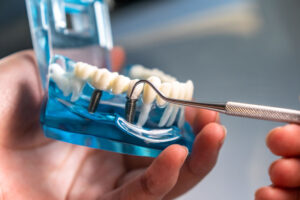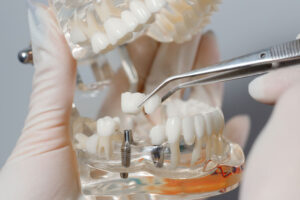
Holiday time can be tough on the waistline thanks to all the treats available at home, work, and cozy gatherings. It can also be hard on teeth and gums. Why? All that sugar adds up, and your Greenwich, CT dentist was not kidding with all those warnings about sweeteners and cavities. However, tooth decay is not the only problem associated with nibbling on candies, pies, cookies, and cakes all day. Another issue is development of gum disease.
How Gum Disease Begins
Gum disease starts as an infection in the gum tissues. In its earliest stage, which is called gingivitis, bacteria begin growing and attacking the surrounding healthy, pink gums. Without special intervention by a dentist, gingivitis will progress to moderate and advanced stages of periodontitis. At that point, the bacteria begin to destroy not just soft tissues but tooth and bone as well. Periodontitis left unchecked almost always leads to widespread tooth and bone loss.
It should be noted that gum disease influences other parts of the body and not just the mouth. Gum disease has been linked to cardiovascular events like stroke, an increase in risk of diabetes, and certain cancers, among other concerns. This illustrates how important it is to catch gum disease as early as possible, because the condition can be completely reversed if professionally addressed at the gingivitis stage.
What Is the Candy-Gum Disease Association?
How do candy and sugary snacks contribute to the potential development of gum disease, though? The connection is that when sugars are allowed to sit on the teeth and gums, they can cause a build-up of plaque. Excessive plaque may encourage bacteria to breed between the teeth and gums, setting the stage for gingivitis.
How Can Someone Tell If They Have Gingivitis?
It can be hard to notice the earliest signs of gingivitis because they might seem vague or occasional. Yet any changes in the health or performance of your mouth deserves a call to your dentist, Dr. Alexander Volchonok, in our office in Greenwich, CT. Some of the most frequently reported indicators of potential gingivitis include constant bad breath, bleeding gums, red gums, swollen gums, tender gums, and receding gums.
You can still indulge in occasional candy canes, pieces of fudge, and bites of homemade brownies, of course. Just make sure to properly floss and brush immediately afterwards. And be sure to contact Dr. Alexander Volchonok at (203) 816-6696 before your next checkup if you spot the beginnings of what could be gingivitis.



